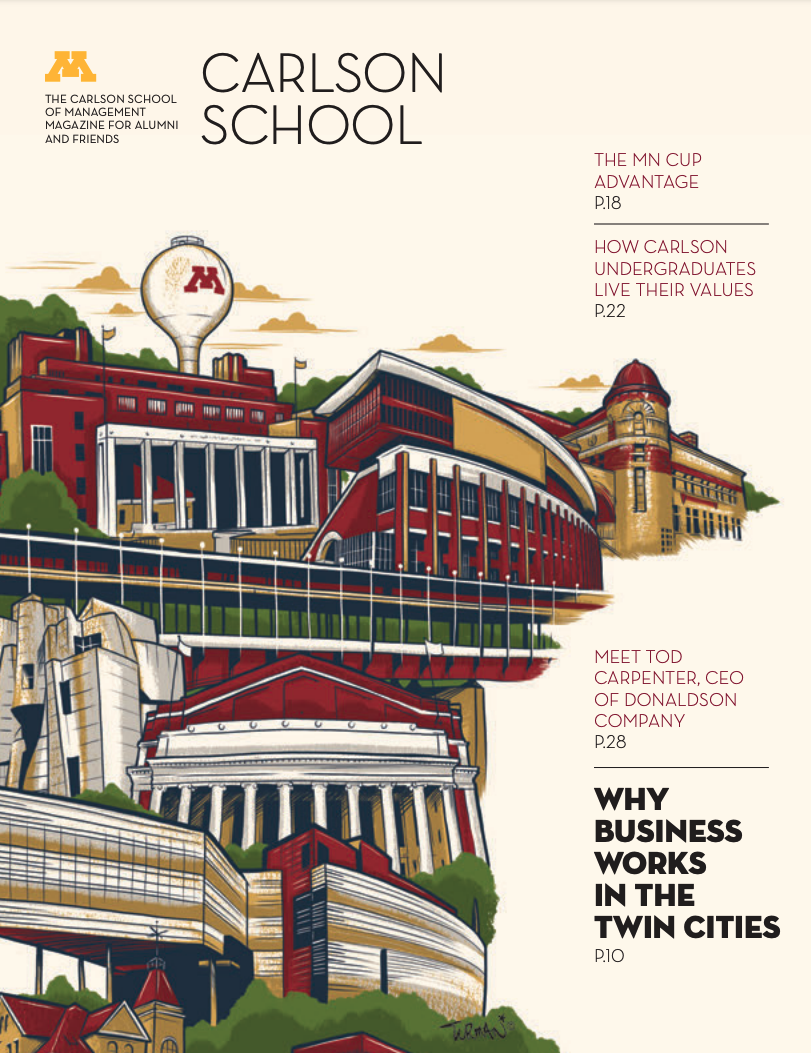
New Guiding Principles Help Undergraduates and Staff Transform Values Into Action
Monday, April 8, 2019
When Raj Singh teaches finance to incoming freshmen, he finds they learn more if he keeps it simple.
“If we can get the principles of finance, calculus, or brand management clear, everything else is just an application of these fundamentals,” says Singh, the Arthur R Upgren Professor of Finance and associate dean of the Undergraduate Program.
That approach was the opportunity he’d been looking for to help all Carlson School undergraduate students take purposeful steps in college, career and life.
Singh and his team distilled their unique personal experiences and beliefs into a set of three guiding principles.
“These are ideas we’ve always believed in, things we’ve been doing all along,” says Singh. “Now, we’re making them explicit.”
We Before I
Our teamwork and inclusivity increase our impact
The first principle promotes taking responsibility for fostering an environment that supports the active inclusion of all community members.
“Share credit with others who help us, give gratitude freely, stay open to ideas, appreciate the contributions of diverse approaches and perspectives,” are the facets of this principle, says Singh. “This collaboration actively builds better organizations.”
When Dornan Bland, ’15 BSB, took over as regional material operations supervisor at Xcel Energy, he used the principle on the job. His team was several hundred thousand dollars over budget. To fix the problem, he focused first on building relationships with the group. Through that process, he gained trust and a common understanding of what needed to be done. Soon, the budget was balanced.
“When your team helps you accomplish something big, you give them credit,” says Bland. “That’s one of the most important things about being a manager.”
Why Before How
Our curiosity and analysis lead to purposeful action
The second principle forces students to stop and reflect. “We have to be curious about the underlying reasoning for doing something,” says Singh. “We can’t just do something because it’s been done before.”
This framework for thoughtful action also helps students tackle big life decisions, excel in their studies and solve business problems. For example, that means thinking through the benefits of a double major prior to building out an academic schedule to make it work. Or before students are taught how to diversify a supply chain, they will ask why a supply chain needs to be diverse.
Work Before Reward
Our resilience and grit are keys to lifelong success
The third and final guiding principle may be the most challenging to commit to. “Students must learn that achieving a long-term goal is far better than immediate results and short-term gains,” says Singh. “While not an easy or obvious lesson to learn, it’s the foundation of a commitment to lifelong growth, resilience, and learning, the essential components of success.”
Singh himself is an embodiment of this principle. After getting his bachelor's in mechanical engineering from Kurukshetra University in India, he arrived in New York City with only a few hundred dollars. He quickly put it to good use, securing a scholarship, working numerous side jobs, and earning an MBA from the City University of New York.
From there, he went on to Carnegie Mellon to earn first an MS in Finance, and then his PhD in Finance, while working the night shift in security to support his young family. These life experiences allow him to relate with many students who are similarly juggling competing demands while in school.
Putting Principles Into Action
A visit to the Carlson School’s Undergraduate Business Career Center (UBCC) highlights the relevance of these principles for students seeking a job.
“This past year, I worked with employers on both the East Coast and West Coast. Unprompted, both talked about the Midwestern work ethic Carlson School students possess," says Lisa Novack, UBCC associate director. "Those values make them successful both here and nationally. That’s probably why 97 percent of our undergraduate students have a job six months after graduation.”
Of course, Singh readily admits, the true test of these principles is not how they sound on paper, but how the students, faculty, and staff internalize them and turn them into actions that drive their lives forward.
“If we can make these principles part of our culture and shared experience, we will attract students who appreciate these principles and give them opportunities to grow in meaningful and fulfilling ways.”
It’s working. The principles can now be overheard in student conversations.
“I better figure out the why before the how,” a student walking into the office of Carlson Global Institute says. Another student says, “My academic advisor just asked me to do the same thing before I change my major."
